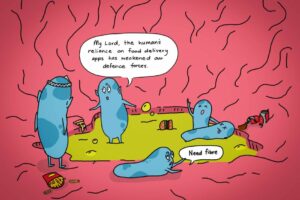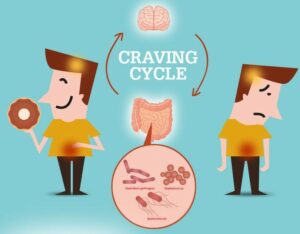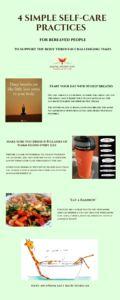
My name is Sabine Horner and as a member of WidowedAndYoung (WAY), I regularly come across posts on our Facebook page which receive lots of responses from members about health issues after the death of their partner. This shows the gaping hole in the understanding of the physical impact of grief by GPs, bereavement support workers and counsellors.
I retrained as a nutritional and grief yoga therapist after my husband, Kevin, was diagnosed with acute myeloid leukaemia in 2017. During my nutrition studies I came across a paper describing the huge impact emotional stress from grief has on all our body systems, not just on our brain. And it is this – automatic – stress response that causes the wide range of health issues many bereaved people start to experience several months – sometimes years – after losing a loved one.
Fight, flight or freeze – our body’s natural response to strong emotions
Our response to – any kind of – stress has not changed since prehistoric times. Back then, it made sense that stress shut down our digestive system to pump all available blood into the heart and the limbs to help us run away from the sabre-toothed tiger.

Meanwhile, our nervous system responsible for this stress response has not caught up with modern times and learned to distinguish between real and perceived threats. Therefore, our bodies perceive grief as a threat which impacts our digestion and our ability to absorb vital nutrients from the food we eat – if we manage to eat at all.
Blood, sweat and tears – what dryness does to our digestion
We need three things for our digestion to work well:
Lots of blood
Lots of fluid
Lots of energy
Stress diverts blood away from our digestive system; it also causes tension in the smooth muscle tissue lining our oesophagus, stomach and intestines, leading to difficulty swallowing and food stagnation. When our stomach is ‘tied in knots’ and lacking blood, food gets stuck and this can cause all sorts of digestive issues such as acid reflux, nausea, gas & bloating, IBS or constipation.
Eating or drinking anything cold will only make matters worse as this further constricts blood flow to our stomach and puts out our ‘digestive fire’.

In grieving, we lose fluids by crying and we often forget to drink. Diarrhea, dry(ing) food, coffee, alcohol or excessive sweating can contribute to dehydration. When our body is too dry for whatever reason, it struggles to produce the right amounts of stomach acid, digestive enzymes and bile needed to break down the carbs, protein and fat in our food into smaller molecules we can easily absorb.
When grief turns us into energy vampires
60% of the energy derived from food is used to digest our next meal. Since grief is exhausting and drains our energy reserves, we soon lack the ‘oomph’ needed for proper digestion. And because we can only absorb what has been fully digested, we start to get nutrient deficiencies including a lack of iron.

Iron is essential for a well-functioning thyroid gland which regulates our metabolism. Without an adequate amount, everything – including our digestion – slows down and we can get symptoms such as constipation (with alternating diarrhea), weight gain, chronic fatigue, hair loss, anxiety, depression and many others. Unfortunately, low thyroid function is often not picked up by conventional thyroid tests.
Grief makes us crave comfort
Grief changes our eating habits. Many people start craving foods high in sugar and unhealthy fats, so-called ‘comfort food’. Additional stressors such as social isolation, physical inactivity, excessive hygiene or lack of sleep can contribute to this kind of food cravings, making us overeat due to emotional rather than true hunger.
Food cravings are the body’s way of communicating any form of imbalance. Because anything with a naturally sweet taste is by nature nourishing, grounding and building strength, the body craves sweet-tasting food when it is malnourished – on a physical, emotional or spiritual level.
Also, our gut is home to over 100 trillion microbes whose survival depends on the food we eat. While our survival depends on a healthy balance between the beneficial and the more harmful microbes that are part of this extremely complex ecosystem.

Thus, when we eat traditional comfort food such as bread, cheese, pasta, pizza or cakes when we feel depleted, low and lonely, we end up feeding the wrong guys. And stress makes them thrive as well.
Emotional stress and the unhelpful eating habits we develop when grieving can create a vicious cycle and sustain unhealthy food cravings because our gut microbes are constantly talking to the brain and vice versa. They can manipulate our eating behaviour in their favour and make us feel happy or miserable depending on which microbes dominate in our gut.

The Ayurvedic doctor I was seeing after Kevin died told me to cook three ‘happy’ meals every day as I was close to getting severely depressed. ‘Happy’ meals contain lots of fibre from a wide variety of vegetables, beans, lentils, grains and fruit which increase the diversity of our beneficial gut bacteria. When they get their preferred fuel, they produce a veritable pharmacy of compounds with many health benefits.
They also keep our blood sugar levels stable helping to curb any food cravings, reduce mood swings and balance our emotions. After all, a blood sugar rollercoaster is the last thing we need when faced with the emotional ups and downs of grieving!

Small steps can have a big impact
Sticking to a healthy diet and a regular daily (meal) routine is easier said than done. Making changes to our diet and lifestyle is difficult under the best of circumstances but much more challenging during bereavement.
The best way is to keep things simple and make one small change at a time. Tiny new habits add up over time and can boost our energy and motivation to make more changes.
Here are 4 simple diet & lifestyle tips to help you – or a bereaved person you know – take the first step towards regaining your health and well-being:

Sabine combines wisdom from ancient traditions with evidence-based nutrition to help support the wellbeing of bereaved individuals. You can read more about Sabine and her work on the Asana Nutrition Website.
To receive our newsletters and information about new blogs – please sign up here.
You can also find Sabine on Facebook, Instagram, YouTube and on LinkedIn.



